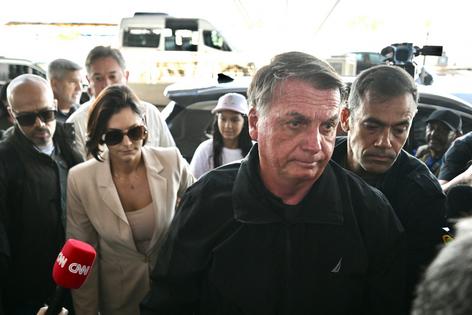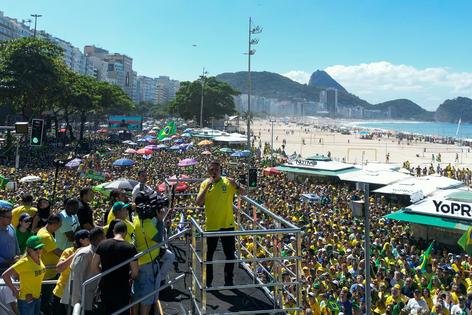Brazil coup charges could end Bolsonaro’s political career − but they won’t extinguish Bolsonarismo
Published in Political News
Brazilian politics are getting more dramatic again.
The South American country’s attorney general filed five criminal charges against former President Jair Bolsonaro and 33 others in its Supreme Court on Feb. 18, 2025, detonating political shock waves. The charges include plotting a coup d’état to prevent Luíz Inácio Lula da Silva’s presidency. The other defendants include several former prominent officials, including a former spy chief, defense minister, national security adviser and Bolsonaro’s running mate.
Lula took office in Brazil for a third time in January 2023, after he defeated Bolsonaro in the 2022 presidential election. Bolsonaro, a right-wing politician allied with U.S. President Donald Trump, had served the previous four-year term. Bolsonaro and his codefendants are also charged with trying to poison Lula and assassinate his vice presidential running mate, Geraldo Alckmin, and Brazilian Supreme Court Justice Alexandre de Moraes; participating in an armed criminal organization; and seeking to violently overthrow the democratic rule of law. He denies doing anything wrong.
As a professor of Brazilian politics, I believe that Bolsonaro’s legal troubles threaten to definitively end his political career. There’s also a possibility that the 69-year-old former president will be sentenced to prison. But, at the same time, the charges could also galvanize Bolsonaro’s base – playing into a narrative that sees the right-wing leader as stymied, unfairly, by the government he used to run.
Bolsonaro’s behavior before, during and after his second presidential campaign was unusual for any president seeking another term. He claimed, when he was still in office, that Brazil’s electronic voting system was not secure and predicted that fraud might crop up in the 2022 elections.
Although he never produced any evidence to support this claim, he promoted it on social media, fostering skepticism about the election among some voters.
Bolsonaro never formally conceded his narrow electoral defeat to Lula in October 2022, insinuating that instead the election had been stolen. In 2023, Brazil’s Supreme Electoral Court ruled that he had abused his power and banned him from running for political office again for the next eight years.
Instead of attending Lula’s inauguration on Jan. 1, 2023, where he would have been expected to participate in the traditional passing of the sash from the incumbent to the incoming president, Bolsonaro flew to Orlando, Florida, on Dec. 30, 2022. He stayed in Kissimmee, Florida, for the next three months.
That meant Bolsonaro was not in Brazil when thousands of his supporters rampaged through and vandalized three government buildings in Brasília on Jan. 8, 2023. The incident was strikingly similar to Trump supporters’ assault on the U.S. Capitol on Jan. 6, 2021.
The new charges accuse Bolsonaro of taking part in a conspiracy to delegitimize the elections. The indictment also alleges that after the results were announced, Bolsonaro and the other defendants encouraged protests and urged the armed forces to intervene, declare a state of siege and prevent the peaceful transition of power from Bolsonaro to Lula.
The evidence in this indictment is based, in part, on plea-bargained testimony by one of the alleged conspirators, the former presidential adviser and army Lt. Col. Mauro Cid.
The attorney general has also accused Bolsonaro and his associates of being linked to businessmen who paid for buses to take Bolsonaro supporters to Brasília so they could participate in the Jan. 8 attacks, which caused damage estimated at 20 million Brazilian reais (US$3.5 million). And the indictment alleges that the coup plot failed because the commanders of Brazil’s army and air force refused to support the conspiracy, although the commander of the navy did, which explains why he was named as a defendant.
If Brazil’s Supreme Court accepts the charges, which seems likely, the legal battle will begin. If Bolsonaro is convicted, he could go to prison.
Bolsonaro’s defense team, for its part, says that the charges are “inept” and unconvincing. His lawyers expressed confidence that they could win the case.
Bolsonaro and his supporters have long criticized Brazil’s Supreme Court, arguing that it has exceeded its constitutional powers and become a judicial “dictatorship.” They have also pushed for Congress to grant amnesty to everyone who took part in or helped carry out the Jan. 8 attacks, including Bolsonaro.
To date, Brazil’s Supreme Court has convicted 371 people for participating in the attacks. Those convicted have received prison sentences of between three and 17 years.
Unlike in the United States, however, there has been a broad consensus in Brazil that the attacks were illegitimate and unacceptable. This consensus includes many lawmakers on the right and center-right in Brazil’s Congress, as well as in state and local governments.
So, although the example of Donald Trump returning to the presidency and pardoning the participants in the Jan. 6 attack on the U.S. Capitol inspires Bolsonaro’s supporters, his path to achieving a similar result is narrower than was Trump’s.
Meanwhile, Trump’s media company, which owns Truth Social and Rumble, sued Moraes, the judge Bolsonaro is accused of plotting to kill, for ordering the suspension of social media accounts and thereby undermining the First Amendment rights of U.S. citizens. The case was filed in federal court in Tampa, Florida, on Feb. 19.
Any trial of Bolsonaro and the other alleged coup plotters could spark a political struggle.
Brazil’s right wing is currently divided between advocates of hard-line Bolsonarismo – a disruptive ideology that advocates social conservatism, a lightly regulated economy, militarism and a strong executive branch – and a more pragmatic conservatism that works within the conventional rules of politics and is mainly focused on patronage and the management of the spoils of office.
Should Bolsonaro and his fellow defendants be tried in the Supreme Court, those hard-liners could be mobilized and energized.
They would see the trial as the political establishment’s persecution of their political hero. And a struggle to find Bolsanaro’s successor, most likely between his son Eduardo and the former president’s wife, Michelle, would ensue.
The successor would claim the mantle of opposition to Lula, who is eligible to seek a fourth presidential term and claims to want to run for reelection in 2026 – when he would be about to celebrate his 81st birthday.
There are, to be sure, some Brazilian politicians who are more moderate than Bolsonaro and would also like to run against Lula next time. They would bring much less baggage to that presidential race.
Their candidacies might offer a possible return to the relative political stability Brazil had experienced for almost two decades before 2013, when the main dividing line in Brazilian politics was between coalitions led by the center-right Social Democratic Party and the center-left Workers’ Party.
To be clear, it’s hard to overstate the potential consequences of the Supreme Court’s deliberation and judgment in this case.
The trial, should it occur, would be televised and also have a geopolitical dimension, because it would be closely watched by advocates of hard-right populism in other countries across the Americas and beyond. The stakes are high.
In the meantime, I have no doubt that Bolsonaro’s supporters will try to use his legal woes to rally his political movement. The judgment of Brazil’s Supreme Court, should it decide to hear this case, could therefore end Bolsonaro’s political career. However, no matter what happens, I believe that Bolsonarismo would still be alive and well as a political force in Brazil and a factor in the 2026 elections.
This article is republished from The Conversation, a nonprofit, independent news organization bringing you facts and trustworthy analysis to help you make sense of our complex world. It was written by: Anthony Pereira, Florida International University
Read more:
Religion is shaping Brazil’s presidential election – but its evangelicals aren’t the same as America’s
Bolsonaro’s indictment over alleged coup plot signals shift in Brazil’s approach to political accountability
How Lula’s big-tent pragmatism won over Brazil again – with a little help from a backlash to Bolsonaro
Anthony Pereira has received funding in the past from the British Academy and the Economic and Social Research Council (ESRC) of the UK.
I am a senior fellow at Canning House, a think tank based in London. This is an unpaid position.


































































Comments